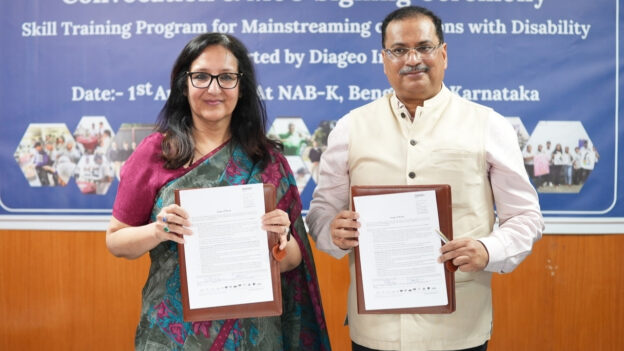In a recent collaboration aimed at enhancing the employability of persons with disabilities (PwDs), the Skill Council for Persons with Disability (SCPwD) has partnered with Diageo India to provide vocational training to 300 students. This initiative falls under Diageo India’s “Learning for Life” program, aiming to address the skill gaps in the Business and Hospitality sectors.
The training, focusing on Food and Beverage Services, will be conducted in various SCPwD-affiliated centres across India. Certified trainers and assessors will oversee the residential programs, offering students a curriculum tailored to their needs. This partnership signifies a step towards inclusivity and diversity in the workforce, aligning with Diageo’s broader societal goals for 2030. The announcement was made in a ceremony attended by representatives from the National Association for the Blind (NAB) Karnataka, along with other industry stakeholders.
Hina Nagarajan, MD & CEO, Diageo India said, “Driven by the common objective of creating a vibrant and diverse workforce, we are delighted to expand our partnership with the Skill Council for Persons with Disability. Last year, we began this initiative by extending the scope of our ‘Learning for Life’ programme, to include the PwD community to help them overcome employment barriers. We strengthen our commitment this year to promote sustainable growth by scaling up this programme to provide equal access to the right resources, skills, and employment opportunities across India.”
Ravindra Singh, CEO, Skill Council for Persons with Disability (SCPwD) said, “We are delighted to partner with Diageo India whose commitment to inclusion and diversity is exemplary. Last year, we trained 100 Persons with Disabilities as part of Diageo India’s ‘Learning for Life’ programme. The success of this programme encourages us to expand this specially curated programme which focuses on providing hands-on training in hospitality skills and enhance employment opportunities.”
The initiative reflects a growing recognition of the need for accessible education and training programs that equip PwDs with the skills necessary to enter and succeed in the workforce, thereby promoting sustainable growth and diversity.

